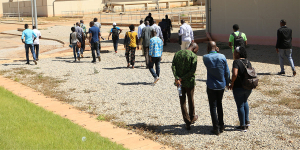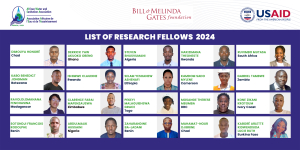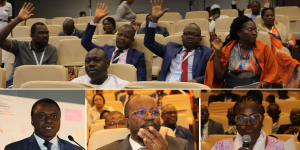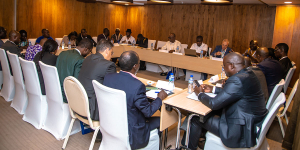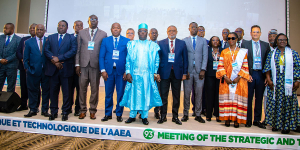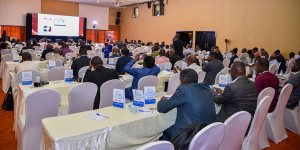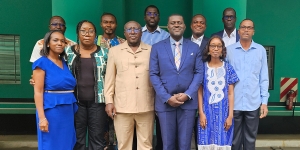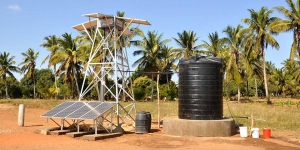Nzickonan Stéphanie
Capacity Building: AfWASA is Organising Benchmarking Visits to South Africa for Sanitation Stakeholders from Malawi and Ethiopia
As part of its mandate to build the capacity of water and sanitation sector stakeholders through peer-to-peer learning partnerships, the African Water and Sanitation Association (AfWASA) is organizing two benchmarking visits to South Africa between August 26 and September 7, 2024. These visits will benefit sanitation actors from Malawi and Ethiopia.
The main aim of these visits, which will take place in the eThikwini municipality in Durban, is to facilitate peer to peer learning and knowledge-sharing in the provision of improved and inclusive sanitation services.
Benchmarking is an important step Operators Partnership developed by AfWASA. It facilitates learning exchange around the tools and approaches used for Citywide Inclusive Sanitation (CWIS) service delivery. It involves a strong service provider (mentor) to build the capacity and improve the performance of another service provider that needs assistance or guidance (mentee).
Participants in these missions will have the opportunity to explore first-hand the innovations, best practices and challenges of providing sanitation services in compact, rapidly expanding urban environments. The agenda also includes technical and strategic discussion sessions, focusing on best practices, as well as policy and governance aspects related to sanitation.
Through these benchmarking initiatives, AfWASA hopes that participants will be able to identify best practices in sanitation and hygiene, and develop concrete action plans for their implementation, including investment. This should contribute significantly to improving sanitation and hygiene conditions in Malawi and Ethiopia, thereby strengthening public health and environmental sustainability in both countries.
It should be noted that the 1st benchmarking visit will take place from August 25 to 28 and will involve sanitation actors from Ethiopia. It is part of the partnership between the AfWASA and UNICEF/IRC.
The second visit is scheduled for September 3 to 7, 2024, and will involve actors from Malawi. It is part of the AfWASA’ SAO-CWIS program, funded by the Bill & Melinda Gates Foundation.
World Water Congress: AAEA presents solutions for promoting women's leadership in the water and sanitation sector
The African Water and Sanitation Association (AfWASA) continues to play a leading role in promoting women's leadership in the water and sanitation sector. Indeed, as part of the World Water Congress and Exhibition being held from August 11 to 15 in Toronto, Canada, under the aegis of IWA (International Water Association), AfWASA is hosting a strategic session on "Progress in Gender -Inclusive Leadership in the water and sanitation sector". Led by AfWASA gender specialist Dr Leticia Ackun, the session aims to foster a collaborative environment where participants can exchange ideas, identify strategies for gender inclusion, and build networks for future initiatives.
During the session, successful case studies highlighting how a gender perspective improves decision-making processes, stimulates community engagement and increases overall effectiveness will be presented. In addition, the concrete experiences from water and sanitation professionals in Africa, Asia and Europe will enrich the discussions; practical strategies for breaking down gender barriers and creating an environment conducive to equal opportunities in the water and sanitation sector will also be shared.
Through this session at the IWA World Water Congress, AfWASA reaffirms its commitment to women's leadership in the water and sanitation sector.
Capacity Building of Young Professionals: AfWASA Awards Research Grants to African Students in Water and Sanitation
The African Water and Saniitation Association (AfWASA) is pleased to announce the recipients of its "AfriCap" and "SAO-CWIS" research grants, funded respectively by USAID and the Bill & Melinda Gates Foundation.
The scholarship, worth USD 1,000 per recipient, is aimed at Master's level students and engineers at the end of their training. Its objective is to support these future leaders in the sector by financing innovative research projects, culminating in a scientific report on a theme related to the water, hygiene and sanitation sector.
After a rigorous selection process conducted by a committee of experts, the following candidates were chosen from a large number of high-quality applications for their innovative projects and their potential to make significant contributions to the sector: Click to download the list.
The AAEA extends its warmest congratulations to the winners and wishes them every success in their research.
For further information, please send an e-mail to This email address is being protected from spambots. You need JavaScript enabled to view it.
93rd AfWASA Meeting: The General Assembly Adopts Major Resolutions
The African Water and Sanitation Association (AAEA) held its Ordinary General Assembly (OGA) this Thursday, August 1st, following the conclusion of the Strategic and Technological Council meeting and the Executive Board meeting. The agenda for this OGA included the presentation of the financial state, the announcement of the list of members of the Strategic Council, the confirmation of specialist groups, and the integration of new members.
Approval of the Activity Report and Financial State
The General Assembly, after considering the Activities Report from November 2023 to June 2024 of the African Water Association, approved it; The General Assembly also took note of the General Comptroller’s Report and the financial statements for the year ending 31 December 2023; took note of the Auditor’s Report and the accounts of the fiscal year 2023; and gave full powers to the Executive Board for the management of the Fiscal year 2023.
Presentation of the Strategic Council
The General Assembly approved the list of 25 members of the Strategic Council. These members, selected for their expertise and commitment, will play a crucial role in guiding the activities and priorities of the AAEA.
Confirmation of Specialist Groups
The General Assembly also confirmed the creation of eight specialist groups, each focusing on specific issue of the sector.
Integration of New Members
Finally, the Assembly welcomed and integrated 19 new members, including two (2) active members, four (4) affiliate members, and twelve (13) individual members. This membership is proof of the attractiveness and relevance of the Association, which continues to expand its network to include dynamic and committed actors from across Africa.
In conclusion, this ordinary session of the General Assembly marked the end of the 93rd AfWASA Meeting. The next meeting will be held in November 2024 in Kampala, Uganda.
Second day of the 93rd AfWASA Meeting: Presentation of the Association's Activities and start of work by Specialist Groups
Opened on July 29 in Lomé, capital of Togo, the 93rd meeting of AfWASA continued on July 30. This second day was devoted to the presentation of the Association's activities for the 1st half of 2024, on the one hand, and the start of the work of the specialist groups, on the other.
The day began with a brief report on the World Water Forum, recently held in Bali, Indonesia. CST Chairman Dr. Papa Samba Diop showed a film summarizing the participation of Senegal and AfWASA. He underlined the active presence of African countries in the discussions and initiatives. He recalled that the forum, entitled “Water for Shared Prosperity”, focused on finding inclusive and innovative solutions to critical water-related issues, particularly those impacting on the achievement of the Sustainable Development Goals (SDGs) by 2030.
Next, Mr. Olivier Gosso, AfWASA Executive Director presented a detailed overview of the Association's activities in the 1st half of the current year. He shared major achievements, including efforts to build the capacity of water and sanitation operators across the continent. He emphasized the importance of the training courses and technical workshops organized for members, as well as the strategic partnerships established with various international organizations.
Another highlight of the day was the presentation of the state of preparations for the 22nd AfWASA International Congress and Exhibition, scheduled for February 16-20, 2025 in Kampala, Uganda. Dr. Rose Kaggwa, 2nd President of the STC and Chair of the Congress Organizing Committee, presented the main stages completed, including the creation of the event's website, the call for papers... She also gave details of the technical sessions, panel discussions and exhibitions planned, while inviting participants to this major industry event.
The afternoon was devoted to the work of AfWASA specialist groups. These groups, made up of experts and professionals in the WASH sector, were tasked with drawing up their roadmap and proposing a 24-month action plan.
Group work will continue until late morning on Wednesday, July 31, before the closing ceremony.
93rd AfWASA Conference: work officially began this Monday morning in Lomé
Some two hundred delegates made up of experts, decision-makers and professionals from the water and sanitation sector from all over Africa have gathered in Lomé, the Togolese capital, for the 93rd meeting of the African Water and Sanitation Association. This event, held under the theme “Resilience of water utilities in Africa in the face of climate change”, reflects the growing challenges facing the continent in terms of water resource management and sanitation in a context of climate change.
The opening ceremony was marked by inspiring speeches highlighting the importance of regional collaboration and innovation to strengthen the resilience of water infrastructures.
Speech by the Managing Director of Société Togolaise des Eaux
In his opening remark, the Managing Director of Togolaise des Eaux (TdE), Mr. Gbati Yawanké Waké, highlighted the importance of adaptation and resilience in the face of the challenges imposed by climate change. “The event that brings us together today in Lomé is very significant for us as players in harmonious social development,” said the Managing Director. He emphasized the impact of global warming on water supply and sanitation services, as well as on the sustainability of water resources. These challenges are exacerbated by the development of the grey economy, which must be counterbalanced by a green economy and greater efforts to protect the environment. He emphasized the need to invest in adaptive technologies and build institutional and technical capacity to address effectively climate crises. “We must redouble our efforts to meet the demands of this vital commodity, water, while promoting sanitation services and protecting our environment,” he asserted.
Speech by the Chairman of the Strategic and Technological Council (STC)
The Chairman of the STC, Dr Papa Samba Diop, stressed the urgent need for a global, coordinated response. He highlighted the importance of resilience financing mechanisms, calling for a paradigm shift to better mobilize global funds for AfWASA programs and projects, under the innovative concept of “BLUE in GREEN,” which symbolizes the integration of water and biodiversity in the fight against climate change.
Speech by AfWASA Executive Director
For Mr. Olivier Gosso, Executive Director of AfWASA, the theme of the conference highlights the complex challenges facing the continent. He stressed the importance of developing adaptation strategies to deal with the effects of climate change, such as unpredictable rainfall, floods and droughts. He also spoke of the climate injustice suffered by Africa, despite its low greenhouse gas emissions. To meet this challenge, he called on all stakeholders to develop adaptation strategies.
Speech by the Minister of the Environment and Forest Resources
The opening ceremony was chaired by the Minister of FOLI-BAZI Katari. In his address, the Minister made a vibrant appeal for united efforts to strengthen the resilience of African utilities in the face of the challenges of climate change. In his speech, he emphasized the crucial importance of a practical, integrated approach to meeting these challenges, stressing the need to invest in adaptive technologies and strengthen the technical and institutional skills of operators in the sector.
The Minister also highlighted the importance of integrated water resource management systems as a key element in adapting to the impacts of climate change. “It is imperative that we adopt a practical and integrated approach by investing in adaptive technologies, such as integrated water resource management systems,” he said. These systems enable more efficient and sustainable use of water resources, which are crucial to the survival and economic development of communities.
The first day of the conference was also marked by the inauguration of the exhibition, followed by a tour of the stands manned by manufacturers offering innovative technologies to meet the challenges of water and sanitation. Delegates were also able to attend conferences and panels offering a platform for constructive exchanges.
AfWASA's meeting continues until Thursday August 1st.
Access to water and sanitation services: Regulators and service providers hold a meeting in Burundi
On July 23 and 24, 2024, Burundi will host the first meeting of the “Water and Sanitation Regulator-Provider Platform”, organized by ESAWAS (Association des Régulateurs de l'Eau et de l'Assainissement d'Afrique Orientale et Australe), AAEA (Association Africaine de l'Eau et de l'Assainissement) and APAA (Association Panafricaine des Acteurs de l'Assainissement). The two-day event, to be held in Bujumbura, Burundi, will bring together some fifty participants from various water and sanitation utilities, regulatory bodies, NGOs and emptiers from twenty African countries.
Under the theme “Factors for sustainable performance improvement in access and quality of services”, the workshop aims to promote effective and efficient provision of water and sanitation services. The objective is to encourage dialogue and experience sharing between regulators and regulated entities, in order to meet the sector's current and future challenges.
The workshop program includes plenary sessions, interactive discussions and presentations by experts. Discussions will focus on policies, funding, and data collection and management.
The Executive Director of AfWASA will make a presentation on “status of water and sanitation service provision in Africa”, which is eagerly awaited given the considerable challenges facing the water and sanitation sector, such as unequal access to services, dilapidated infrastructure and lack of adequate funding.
Experts from USAID on mission at AfWASA to assess AfriCap program data quality
As part of the implementation of the AfriCap program (AfWASA Capacity Building Program), a Data Quality Assessment (DQA) is being organized by the United States Agency for International Development (USAID). The purpose of this assessment is to validate the reliability and credibility of the data used to measure the program's performance.
To complete this mission, a USAID team is in Abidjan at the headquarters of the African Water and Sanitation Association (AfWASA) from July 15 to 19, 2024, to assess the systems and processes for collecting, managing and reporting data relating to the AfriCap program.
During their stay, the USAID experts will work closely with AfWASA teams, in particular the Program Management, Monitoring and Evaluation and AfriCap Program Coordination departments, to analyze the available data and ensure its accuracy and relevance.
The results of this evaluation will enable USAID to make informed decisions about further collaboration with AfWASA.
USAID's mission is part of a broader effort to promote excellence and transparency in the management of programs funded by the Agency.
The deadline for submitting abstracts has been extended
We're please to announced that the deadline for submitting papers/abstracts has been extended to July 31, 2024.
This extension aims to provide additional time for more authors to finalize their work and ensure the highest quality of submissions.
Proposals for papers are requested on the different topics indicated below under the following tracks:
Track 1: Climate Change and Integrated Water Resources Management
Topics:
-
Climate change resilience and adaption
-
Source protection and catchment management
-
Modelling for water resource management
-
Water, energy and food nexus
Track 2: Water Management
Topics:
-
Water treatment technologies
-
Water Supply systems
-
Non-Revenue Water Management
-
Pro-poor and rural water services
-
Water quality management
-
Innovative water supply tools, systems and practices
Track 3: Sanitation Management
Topics:
-
Sewered and non-sewered services
-
Solid waste management
-
Sanitation safety planning
-
Wastewater treatment technologies and Faecal sludge
management
-
Resource recovery and circular economy
-
Innovative sanitation tools, systems and practices
Track 4: Capacity Development, Communication and Partnerships
Topics:
-
Water and sanitation operators’ partnerships
-
Career building and competencies development
-
Performance benchmarking and networking
-
Private sector participation
-
Communication tools and systems
-
Efficient utility management and operation
Track 5: Governance and Financing
Topics:
-
Policies, reforms and institutional frameworks
-
Innovative finance
-
Pricing and cost recovery
-
Local market-financing mechanisms
Track 6: Research, Technology, and Innovation
Topics:
-
Data Analytics and Artificial Intelligence
-
Innovations and big ideas
-
Research and funding
-
Digital water
Note that the 22nd AfWASA International Congress and Exhibition 2025 is the main water and sanitation event in Africa in 2025.
So, don't miss the opportunity to share your research and innovations with the community.
Access to drinking water in rural areas: AfWASA seeks inspiration from Rwanda and Benin
As part of the implementation of AfWASA programme on "Empowered WASH Systems at rural District-level in Africa (EMPOWERWASH-AFRICA)", a delegation from the Association's will visit Benin and Rwanda between July 9 and 20, 2024, to draw inspiration from the management of rural drinking water supply services in these two countries.
The African Water and Sanitation Association (AAEA), with the support of the Conrad N. Hilton Foundation (CNHF), has launched the EMPOWERWASH-AFRICA program. This program aims to improve understanding of Water, Hygiene and Sanitation (WASH) systems at rural district level. It also seeks to identify and disseminate best practices, and to fill existing gaps to improve service delivery performance.
The delegation will examine rural water supply service management models in these two countries, with the aim of identifying best practices and key success factors that will help the Association build a broader rural water access program as part of its 2024-2028 strategic business plan.
Discussions will be held with rural water supply stakeholders to understand and analyze their roles and responsibilities, identify success factors and the main challenges they face. At the end of the mission, these discussions will result in: (1) a detailed report on rural water and sanitation service management models in Benin and Rwanda, including an analysis of the key success factors and specific challenges encountered (2) a complete mapping of rural drinking water supply stakeholders in these two countries, and (3) a practical recommendations document presenting the good practices identified and concrete proposals for improving water and sanitation service management in the target countries of the EMPOWERWASH-AFRICA program.
The EMPOWERWASH-AFRICA program targets 30 rural communes/districts in si6 African countries: Burkina Faso, Cameroon, Ethiopia, Ghana, Malawi and Uganda.
The delegation comprises the Director of Programs, Dr Siméon KENFACK; the Water Program Coordinator, Mr Gilles DJAGOUN; the EMPOWERWASH-AFRICA Program Coordinator, Dr Hemez KOUASSI; the Knowledge Management and Sharing Specialist, Mr Elvis ELOUNDOU; and the Events & Marketing Manager, Ms Micheline LAWSON.

 English
English  Français
Français 
